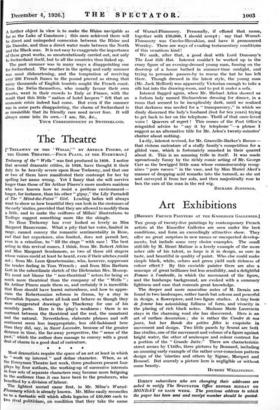The Theatre
[" TRELAWNY OF THE WRIJS," BY ARTHUR FINER°, AT THE GLOBE THEATRE.—FOUR PLAYS, AT THE EVERYMAN.]
Trelawny of the " Wells" was first produced in 1898. I notice that several dramatic critics, in 1926, have thought it their duty to be heavily severe upon Rose Trelawny, and that one or two of them have manifested their contempt for her by spelling her name wrong. Yet I fancy that she will survive longer than those of Sir Arthur Pinero's more modem maidens who have known how to resist a perilous environment— longer, for instance, than his other " gipsy," the Lily Parradell of The " Mind-the-Paint" Girl. Leading ladies will always want to show us how beautiful they can look in the costumes of the early 'sixties, provided that they are allowed to modify them a little, and to make the coiffures of Millais' illustrations to Trollope suggest something more like the shingle.
No Rose Trelawny has ever looked so lovely as Miss Margaret Bannerman: What a pity that her voice, limited in range, cannot convey the romantic sentimentality in Rose, and that her experience, also limited, does not permit her, even in a crinoline, to " fill the stage " with ease ! The best acting in this revival comes, I think, from Mr. Robert Atkins and Miss Margaret Scudamore, as two of those old stagers whose voices could at least be heard, even if their aitches.could not ; from Mr. Leon Quartermaine, who, however, suppresses the tender. feeling in Tom. Wrench ; and from Miss Barbara Gott in the subordinate sketch of the Dickensian Mrs. Mossop. We must not blame the " non-theatrical " actors for being so much more theatrical than the company of the " Wells " Sir Arthur Pinero made them so, and certainly it is incredible that Rose should have learnt naturalness, and how to appre- ciate the Robertsonian reforms in drama, by a stay in Cavendish Square, where all look and behave as though they were exaggerated drawings by Thackeray for one of his monthly parts. Here is the play's weakness : there is no contrast between the theatrical and the real, the unnatural and the natural. Nevertheless, elaborate phrases and soft sentiment seem less inappropriate, less old-fashioned here than they did, say, in Sweet Lavender, because of the greater distance in time, the far-away perspective, the " sense of the Past," which the author does manage to convey with a great deal of charm in a good deal of caricature.
* * * *






























































 Previous page
Previous page